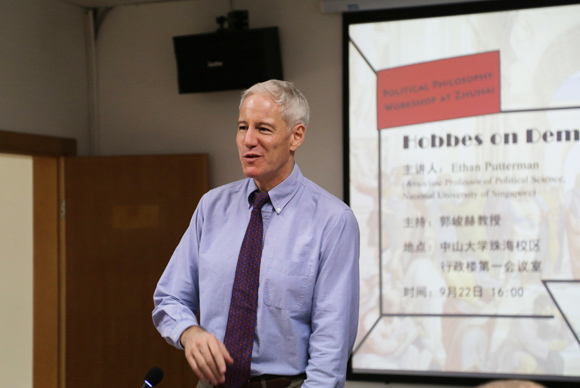Ethan Putterman on Thomas Hobbes
Source: Department of Philosophy (Zhuhai)
Written by: Department of Philosophy (Zhuhai)
Edited by: Wang Dongmei
On Thursday 22 September, 2016, Prof. Ethan Putterman of the National University of Singapore gave the inaugural presentation of Political Philosophy Workshop of the Department of Philosophy (Zhuhai) at Sun Yat-sen University, delivering a paper entitled ‘Hobbes on Democracy and War’. Prof. Putterman is an eminent political theorist and Rousseau scholar, who is now transitioning into Hobbes studies as part of his research project on the role of social psychology in early modern social contract theory.

Prof. Ethan Putterman delivering a paper entitled ‘Hobbes on Democracy and War’
Prof. Putterman began his talk by noting that, while Hobbes has traditionally been viewed as an opponent of democracy, there is a growing revisionist movement of Hobbes scholars, who deny that Hobbes was completely opposed to democracy, and may even have been sympathetic to it. He suggested that, given the recent rise of authoritarian personalities within western democracies, one danger of the revisionist movement is that it will blind us to Hobbes’ warnings about the way in which democracy can empower orators who flatter the mass, on the one hand, while engaging in demagoguery and war-mongering, on the other.
Prof. Putterman did not deny the existence of a textual basis for the revisionist interpretation but maintained that it was outweighed by other textual sources, on the one hand, and can be explained away in terms of Hobbes’ desire to win-over supporters of parliamentary politics and ancient democracy to his conception of absolute and undivided sovereignty, on the other. He maintained that once the evidence is fully weighed, the most reasonable interpretation to be drawn is not just that the revisionist reading is inaccurate, but that even the traditional reading underestimates the extent of Hobbes’ opposition to democracy.
In the role of respondent, Dr. Tim Beaumont of Department of Philosophy (Zhuhai) noted the importance of distinguishing between evidence that Hobbes did not really believe the statements in which he appears to suggest that democracy can be a viable form of government, and evidence that he is logically committed to rejecting democracy regardless of whether he realized this or not. He also questioned whether Prof. Putterman’s textual evidence, purporting to show that Hobbes believed that monarchy is a far more stable and effective form of government than democracy, was sufficient to establish the conclusion that Hobbes took democracy to be a completely lost cause.
Following this exchange, Prof. Putterman took a wide-range of questions from an audience consisting of students and faculty members. This led to an extremely interesting discussion, in which graduate students with an interest in Hobbes were provided with the opportunity to interact with a world-class specialist in their field of enquiry.
The Political Philosophy Workshop will be open to scholars from around the world as well as Sun Yat-sen University faculty, providing them with an opportunity to present their research in all areas of political philosophy and political theory, including historical studies, contemporary theory, and applications thereof. We are extremely grateful for Prof. Putterman’s enlightening talk and his participation in our inaugural workshop. As we build on this initial success, we hope to turn our new department into one of Asia’s largest centers for research in political philosophy, and make Sun Yat-sen University a major port of call for scholars wishing to exchange ideas.
